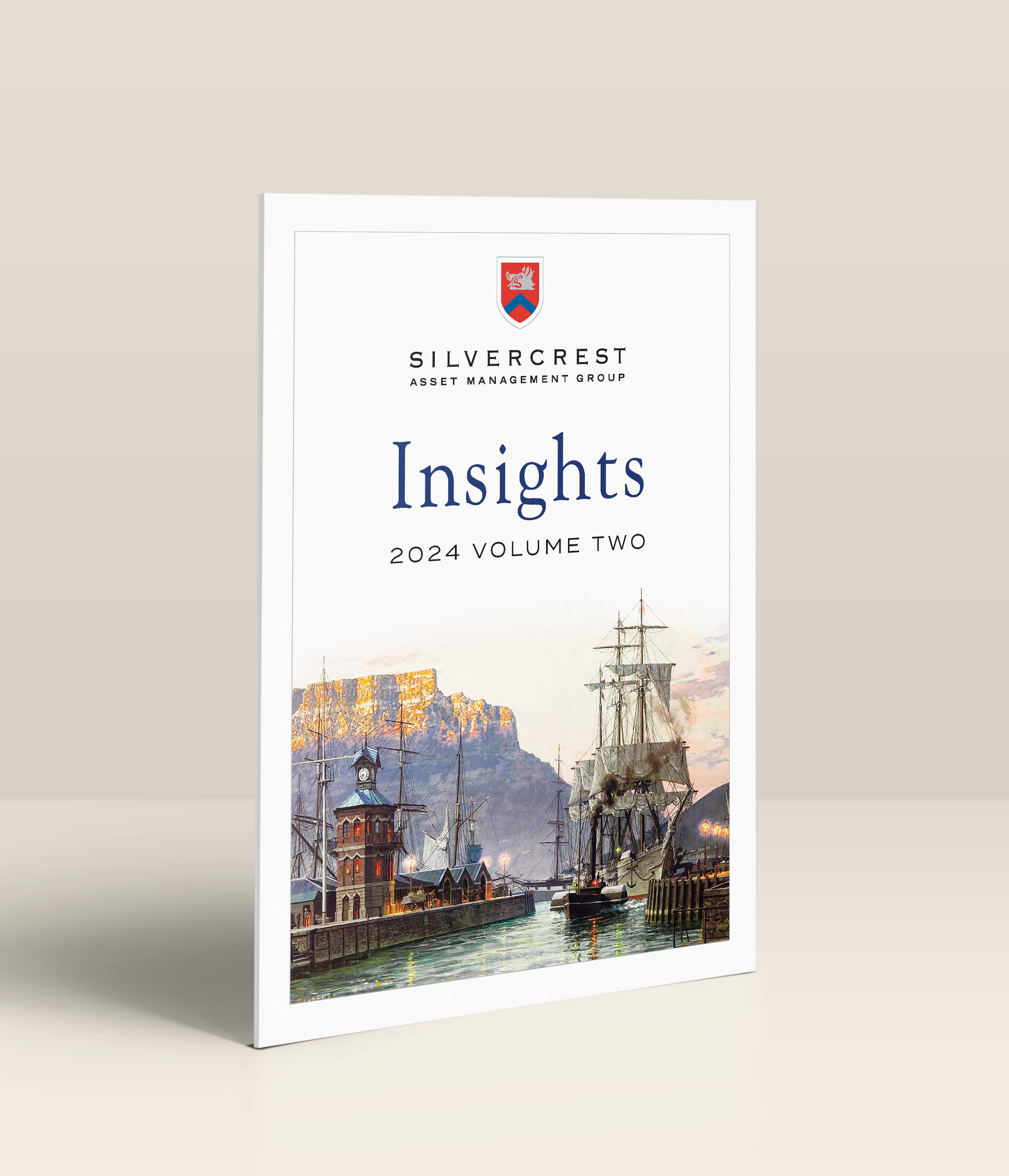When we imagined in January’s first quarter note what the next few years would look like, we wrote that the British would shock everyone by voting to leave the European Union. We could not have foreseen that that expectation would become reality less than six months later.
When a majority of Britons voted “Leave” on June 23, there were respected commentators who compared it to the Cuban Missile Crisis, 9/11, or the 2008 Financial Crisis. The Pound and the FTSE 100 stock index tanked, pulling other global markets down with them. Then, just days later, many (but not all) of those markets rebounded, seeming—on second thought—to brush off “Brexit” as inconsequential. So which is it: Apocalypse Now or Apocalypse Not?
Rather than trying to chase the latest swing in sentiment, investors must ground themselves in a longer-term view, one that sees Brexit not as an isolated shock, but as part of an ongoing story. That story has been an integral part of our investment thinking for some time.
Brexit Didn’t Break It
Europe is broken, but Brexit didn’t break it. At worst, Brexit is a symptom of a crisis that runs far deeper. At best, it’s a wake-up call to fix what’s wrong.
Since World War II, the watchword in Europe has been “integration”. A common market, supported by coordinated decision-making, was supposed to foster peace and shared prosperity, and to a large extent, it succeeded. In recent years, however, some of the ever-tightening ties meant to bind Europe together have begun tearing it apart instead. Rapid expansion of the European Union introduced countries with wildly different development levels, giving rise to serious imbalances in savings and consumption, trade and financing. The adoption of a single currency by most EU members, severely limited the avenues available for fixing these imbalances, heightening conflict and resentment over “shared” economic policy. Today, the Eurozone economy is barely larger than it was in 2007, while persistently high youth unemployment rates bode poorly for a continent with a rapidly aging population. At the same time, migration of workers within Europe, along with refugees arriving from the Middle East, have given many the sense they are losing control of their own communities and economic destinies and fallen prey to unaccountable decisions made in Brussels.
Great Britain has always been something of a cuckoo in the European Union nest. Throughout its history, it prized its island status—and its globally-traded currency—and identified more closely with its own former Empire (“the English-speaking peoples”) than with the Continent. As an unsullied victor in World War II, Britain felt no moral duty to subordinate its nationhood to the “common good”. Its first bid to join the Common Market, in 1961, was vetoed by an untrusting France. The debate over whether to try again was long and heated, and even when Britain did join in 1973, the controversy never entirely died out. For their part, integrationists on the Continent saw the compromises and caveats Britain regularly insisted on—including its refusal to drop the Pound for the Euro—as an infuriating obstacle to “ever closer union.” In short, the U.K. has always been a wobbly wheel on the E.U. cart, and it’s not too surprising it would eventually fall off. What sets Britain apart isn’t the depth of its grievances—widely shared, and felt far more keenly by others because of the single currency—but its confidence in its ability to chart a better path on its own.
One thing that’s become crystal clear, however, in the days following the vote, is that the campaigners for Brexit had absolutely no plan on how to proceed, if they got their heart’s desire. Article 50 of the E.U. Treaty outlines a vague procedure for a country to negotiate a “departure agreement,” taking no longer than two years, but gives no indication of what such an agreement should consist. Theresa May, the newly chosen successor to David Cameron as Britain’s Prime Minister, says the U.K. won’t be ready to invoke Article 50, and even begin the process, before the end of this year. Even if the next leader at No. 10 were gung-ho to make Brexit happen, he or she would face formidable political obstacles. It’s far from clear that the 52% who voted “Leave” were all voting for the same thing, especially when it comes to immigration policy. And then there’s Scotland, which wants to stay in the E.U. more than it wants to stay in the U.K. As a result, celebration soon gave way to political disarray.
If the Brexit vote had been binding, this disarray would be a disaster, with Britain hurtling off a cliff into the unknown. Since it wasn’t binding, it just means that everyone will play for time, which is good. We’re not suggesting the Brexit vote will be ignored or reversed, only that Britain’s leaders have the time—and should take the time—to sort out what comes next.
Some voices in Europe—namely EU Commission President Jean-Claude Juncker, EU Parliament President Martin Schultz, and French President Francois Hollande—are pressing for Britain to pack and go as soon as possible. They insist the E.U. should not talk with Britain, about anything, until it invokes Article 50. Like spurned lovers, they imagine that making a punishing example of Britain—cast aside with nothing but its regrets—will deter others with an eye to stray.
Wiser heads, including German Chancellor Angela Merkel, disagree—and will likely prevail. They know, to begin with, that the E.U. has no authority to force Britain’s hand on the basis of a non-binding poll. More importantly, they realize that their problems don’t begin and end with Britain. According to the latest Pew survey, the E.U. is just as unpopular in Spain (49% unfavorable) and Germany (48%) as the U.K. (48%), and far more unpopular in France (61%), numbers that have deteriorated alarmingly in recent years. Hustling Britain out the door, so that the E.U. can “move on”, begs the question “to where?” The answer isn’t as obvious as some in Brussels seem to think, when plenty of Europeans have the same complaints as Britons.
The history of European union has always been two steps forward, one step back—and often, the step back turned out to be a good thing. Brexit poses a challenge, but also an opportunity to rethink the path that Europe has been on, with precious little to show for it. The problem, we‘d argue, isn’t the reluctance of unruly Europeans to march in lockstep, but the failure to frame a positive growth agenda that unlocks the creativity and motivation of this immensely skilled population. If the Brexit vote shakes Britain and its European neighbors from their complacency, and prompts them to take their blinders off, then it may be just the “step backwards” they need.
A Story, Not a Shock
So what does this mean for investors? When a big event like Brexit happens, investors instinctively feel like they should react, like they should do something to avoid becoming roadkill. In fact, investors should only change their strategy if what happened has changed their outlook. Brexit, in many ways, confirmed our outlook: not just the prediction we ventured in January, but the broader concerns about Europe’s direction we’ve been voicing for some time.
To be sure, there are some specific implications of Brexit that investors need to be conscious of. The most significant is simply the shadow of uncertainty it casts. E.U. rules and regulations permeate virtually every aspect of life in the U.K.; Whitehall bureaucrats say it could take 10 years to untangle it all—which, of course, is time they won’t have. Britain is the rest of Europe’s largest partner for both trade and investment, in both directions. It’s not hard to imagine businesses postponing major decisions, and investments, until they have a better idea what lies ahead. Despite assurances they can stay, more than 3 million E.U. citizens living in the U.K., many of them small business owners, may face doubts about their future. Banks in London’s financial district want concrete answers how Brexit will affect them, and may limit new lending and expansion until they get some. The Bank of England reports that consumers are already spending more cautiously, and warns that tightening credit conditions—which it is working to counter—could tip the British economy into recession.
These and related concerns have driven a steep drop in the Pound, which fell −8.3% against the dollar in June, down −9.5% this year. The plunge puts renewed upward stress on the dollar, and threatened to revive the headwinds to growth and corporate earnings the U.S. experienced from the strong dollar all last year. While the Euro also fell following the Brexit vote, overall, it has remained steady, actually up +1.8% against the dollar this year. But any deterioration in the Euro could put pressure on China, whose currency has already drifted −2.3% lower vs. the dollar, to let the yuan slide further. Meanwhile, the flight away from Sterling has contributed to a steep rally in the Yen (up +8% in June, +17% this year vs. the dollar), putting the Japanese in a very tough spot as they struggle to avoid deflation and stimulate growth. For the U.K. itself, the fall in the Pound acts as a shock absorber, giving a boost to exports and limiting the damage from any downturn. A flexible exchange rate is a cushion a lot of other European economies wish they had.
The prospect of a U.K. recession may sound ominous. After all, Britain is the fifth largest economy in the world, and the largest overseas market for U.S. services (accounting for 9% of U.S. service exports, while the E.U. as a whole accounts for almost a third). But it’s important to remember that a majority of Britons voted “Leave” because they were persuaded that the long-term benefits outweighed what they knew would be short-term pain.
An anemic Europe has always been a chronic factor in this recovery. The question is whether the Brits can do better, or make things worse. We think it’s up to them. The potential benefits of Brexit are real, but they won’t materialize on their own. The downside risks are also real, and they have to be managed. At best, Brexit only opens the door; Britain has to step through that door, with better policies, while avoiding tripping over a very large doorstep. That’s why we stress the need to see Brexit as a story, which we have followed and will continue to follow, rather than a one-off shock, demanding a one-off response.
Resilient U.S. Momentum
Any concerns over Brexit need to be balanced by a look at the latest U.S. economic data, which points to resilient growth momentum. Q1 GDP was again revised upwards, from +0.8% to +1.1%, and the Atlanta Fed projects that GDP will grow by +2.3% in Q2.
The two ISM surveys offer the most encouraging indication that growth will continue. At the start of the year, a 5-month contractionary (<50) slump in the Manufacturing Index was touted by many as the sign of an impending U.S. recession (a conclusion we argued against). In June, ISM Manufacturing surpassed expectations to reach 53.2, its fourth straight month of expansion, and its highest reading for over a year. New orders were especially solid at 57.0, and export orders continued to climb, to 53.5. The ISM Non-Manufacturing survey, which covers a broader swathe of the economy, stayed strong through Manufacturing’s slump, but appeared to be cooling a bit in recent months. In June, it surged back +3.6 points to 56.5, beating expectations. New orders hit 59.9, with new export orders at 53.0, suggesting solid growth ahead.
These surveys need to be weighed against anemic industrial production numbers, showing output down −0.4% from April to May, down −1.4% from the year before. Manufacturing output is flat year-on-year. The weakest part of the economy continues to be business investment, with orders for core capital goods down −3.6% from last year, and falling. Nevertheless, June’s strong jobs report, showing a net gain of +287,000 new jobs, helped negate concerns prompted by May’s weak figure that the slowdown in investment would translate into a slowdown in hiring. It also increases the likelihood that the Fed may hike interest rates again, later this month. Post-Brexit talk of a Fed rate cut was, as we said at the time, wildly premature.
Home and auto sales, which had been leading growth, have cooled a bit. But consumer confidence remains quite strong, and consumer spending rose a solid +0.4% in May, on top of April’s impressive +1.0% surge, which the savings rate edged down slightly to 5.3%. The rebound in jobs growth should help support this story. Despite volatile monthly figures, the NAHB Housing Market Index for June rose to 60, with the industry increasingly confident in rising demand.
The post-Brexit hit to the U.S. stock market was more fleeting than we expected, with the S&P 500 index ending the month as it began, up +2.7% (+3.8% including dividends) on the year. Valuations remain elevated at 12-month trailing P/E ratios of 21x operating earnings and 23x reported earnings per share—calculations predicated on a hoped-for +18% rebound in quarterly earnings from Q1 to Q2. Brexit’s impact on the bond market was more striking, pulling 10-year U.S. Treasury yields down to—literally—all-time lows. The conventional take on this would be that the bond market is signaling a coming U.S. recession, but the weaknesses we see driving down U.S. rates are external, not internal. Negative rates abroad, and the expectation of future easing, along with low inflation expectations, are pushing foreign investors to seek yield in U.S. Treasuries, keeping rates low—which, indirectly, supports higher U.S. equity valuations.
So the world looks increasingly to the U.S. to drive growth and investment returns. That certainly has validated our position favoring U.S. over non-U.S. assets. But it also creates a fragile environment, with little room for error. We continue to believe that prospects for sustained growth depend on real global rebalancing, which means real structural reform in Europe, China, Japan, and emerging markets. Such reform may only come with the next economic cycle. In the meantime, as we have said before, we see this as a market that will reward investors with realistic expectations, and with the patience to see their convictions bear fruit.
This communication contains the personal opinions, as of the date set forth herein, about the securities, investments and/or economic subjects discussed by Mr. Chovanec. No part of Mr. Chovanec’s compensation was, is or will be related to any specific views contained in these materials. This communication is intended for information purposes only and does not recommend or solicit the purchase or sale of specific securities or investment services. Readers should not infer or assume that any securities, sectors or markets described were or will be profitable or are appropriate to meet the objectives, situation or needs of a particular individual or family, as the implementation of any financial strategy should only be made after consultation with your attorney, tax advisor and investment advisor. All material presented is compiled from sources believed to be reliable, but accuracy or completeness cannot be guaranteed. © Silvercrest Asset Management Group LLC





